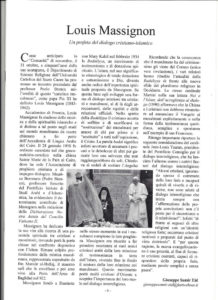PARISH – 1/12 – 2012
As anticipated in “Community” in November, on October 31, fifty years after his death, the Department of Religious Sciences of the Catholic University of the Sacred Heart promoted a meeting chaired by Professor Paolo Branca on the legacy of this “Muslim Catholic”, as Pope Pius XI called Louis Massignon (1883-1962). An Academician of France, Louis Massignon was a scholar of Islamic mysticism and spirituality and distinguished himself so much in his studies of the Muslim world that he was called to join the Academy of Arabic Language in Cairo. On January 28, 1950 he was ordained a priest in the Greek-Melkite-Catholic rite in the Sainte Marie de la Paix Church in Cairo, where the Association of Christian Prayer and Dialogue Commitment is located.
Maurice Borrmans (White Father), Professor Emeritus of the Pontifical Institute of Arabic and Islamic Studies, highlighted Massignon’s decisive contribution to the drafting of the Declaration Nostra Aetate of the Second Vatican Council. Massignon dedicated his life to the search for a spiritual kinship between Christians and Muslims, finding the doors closed in the dogmatic confrontation with Islam. He was deeply struck by Muslim mysticism, represented above all by Ibn Mansùr al-Hallaj, the Sufi master who was crucified and then burned alive at the Arch Gate of Baghdad in 922. Massignon founded the Badaliyya, a movement of witness and spiritual donation, in Damietta with Mary Kahil in February 1934. Islam, in its etymological meaning of total donation and submission to God, also became the root of the spiritual experience proposed by Massignon. On this basis, he developed a form of interior dialogue between Christians and Muslims, beyond the rigidities and off

icial relations. In the spirit of Badaliyya the Christian accepts to suffer and to sacrifice himself in “substitution” for Muslims for the love of the one who first “substituted” himself for all in atonement, Christ. The word “Badai” in fact means accepting to take on the sins or weaknesses of others in order to guarantee them a salvation that they would not achieve alone. He asked the sodalists to recite the Angelus at the same time as the Muslims say their prayers. Massignon had succeeded in making his Arab Christian friends aware of their mission of witness in the land of Islam, living to the full the mystery of their relationship with Muslims. This movement led many Christians of the East to discover the importance of their role in inter-religious dialogue. Recalling that the knowledge Muslims have of Christianity comes to them from the Koran (the only true revelation), the various speakers reiterated the relevance of Badaliyya in the face of the new challenges of reli
gious pluralism in the West. Cardinal Martini himself in his letter “Noi e l’Islam, dall’accoglienza al dialogo (1990)” affirmed that the Church and Christians must not renounce to proclaim the Gospel to Muslims explicitly or in the form of daily witness, simple and spontaneous following the example of St. Francis. I think it important to report the following consideration of Cardinal Jean-Louis Tauran, president of the Pontifical Council for Inter-religious Dialogue, who raised the alarm against the bad advocates of inter-religious dialogue: “Some Christians, often ignoring the content of their faith and therefore unable to live it, are not suitable for inter-religious dialogue which always begins with the affirmation of their convictions: there is no place for syncretism or relativism! In fact “in front of the followers of other religions with a strong religious identity; motivated and prepared Christians are needed from the doctrinal point of view”. And “for this reason, the new evangelization is a priority, in order to train coherent Christians, capable of responding to their faith, through simple words and without fear”.
Giuseppe Samir Eid
Free web translation from the original in Italian
The published articles intend to provide the tools for a social inclusion of the migratory flow, shed light on human rights and the condition of life of Christians in the Islamic world from which the author come from. Knowledge of the other, of cultural and religious differences are primary ingredients to create peace in the hearts of men everywhere, a prerequisite for a peaceful coexistence and convinced citizenship in the territory.